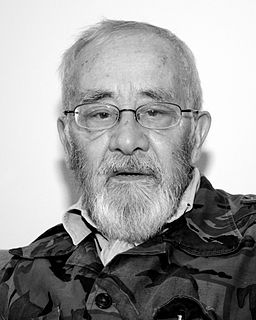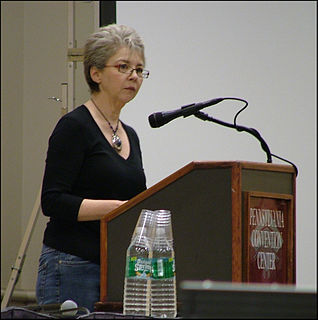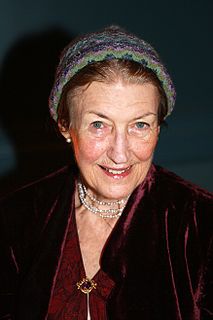Top 446 Anne Of Windy Poplars Quotes & Sayings - Page 8
Explore popular Anne Of Windy Poplars quotes.
Last updated on April 19, 2025.
Walking the streets on winter nights kept him warm, despite the cold nocturnal passions of uprising winds. His footsteps led between trade-marked houses, two up and two down, with digital chimneys like pigs' tits on the rooftops sending up heat and smoke into the cold trough of a windy sky. Stars hid like snipers, taking aim now and again when clouds gave them a loophole. Winter was an easy time for him to hide his secrets, for each dark street patted his shoulder and became a friend, and the gaseous eye of each lamp glowed unwinking as he passed.
In a brilliant fusion of fact and fiction, Jayne Anne Phillips has written the novel of the year. It's the story of a serial killer's crimes and capture, yes, but it's also a compulsively readable story of how one brave woman faces up to acts of terrible violence in order to create something good and strong in the aftermath. Quiet Dell will be compared to In Cold Blood, but Phillips offers something Capote could not: a heroine who lights up the dark places and gives us hope in our humanity.
If only it were possible to love without injury – fidelity isn’t enough: I had been faithful to Anne and yet I had injured her. The hurt is in the act of possession: we are too small in mind and body to possess another person without pride or to be possessed without humiliation. In a way I was glad that my wife had struck out at me again – I had forgotten her pain for too long, and this was the only kind of recompense I could give her. Unfortunately the innocent are always involved in any conflict. Always, everywhere, there is some voice crying from a tower.
We're shaking up a format, which I think is always a good thing. The thing about [2011 Oscar hosts] James [Franco] and Anne [Hathaway] is, they've both hosted Saturday Night Live, and they both did a good job at it. So they are accustomed to working with short rehearsal time, and live, lots of pressure, rewrites, things like that. They can make quick changes, which is very advantageous, and they're skilled comedians.
A submissive spirit might be patient, a strong understanding would supply resolution, but here was something more; here was that elasticity of mind, that disposition to be comforted, that power of turning readily from evil to good, and of finding employment which carried her out of herself, which was from nature alone. It was the choicest gift of Heaven; and Anne viewed her friend as one of those instances in which, by a merciful appointment, it seems designed to counterbalance almost every other want.
I do like Canadian poetry. Christian Bök, Anne Carson, Carmine Starnino, and Don McKay are a few of the Canadian poets whose work has been important to me. But I'm not sure that I do see poetry as a world apart. Some of my metaphors are based in the fantastic, but I try to be true to life as I understand it. That understanding is affected by my Canadianness, my Americanness, my whiteness, my gender, my age, my education, my experience...everything about me affects my view of reality. But I try to wrestle against those partialities, not embrace them.
I find the treatment of royalty distinctly peculiar. The royal family lives in palaces heavily screened from prying eyes by fences, grounds, gates, guards, all designed to ensure the family absolute privacy. And every newspaper in London carried headlines announcing PRINCESS ANNE HAS OVARIAN CYST REMOVED. I mean you're a young girl reared in heavily guarded seclusion and every beer drinker in every pub knows the precise state of your ovaries.
But pearls are for tears, the old legend says," Gilbert had objected. "I'm not afraid of that. And tears can be happy as well as sad. My very happiest moments have been when I had tears in my eyes—when Marilla told me I might stay at Green Gables—when Matthew gave me the first pretty dress I ever had—when I heard that you were going to recover from the fever. So give me pearls for our troth ring, Gilbert, and I'll willingly accept the sorrow of life with its joy." -Anne
The Jewish sages also tell us that God dances when His children defeat Him in argument, when they stand on their feet and use their minds. So questions like Anne's are worth asking. To ask them is a very fine kind of human behavior. If we keep demanding that God yield up His answers, perhaps some day we will understand them. And then we will be something more than clever apes, and we shall dance with God.
I wonder what a soul…a person's soul…would look like,' said Priscilla dreamily. 'Like that, I should think,' answered Anne, pointing to a radiance of sifted sunlight streaming through a birch tree. 'Only with shape and features of course. I like to fancy souls as being made of light. And some are all shot through with rosy stains and quivers…and some have a soft glitter like moonlight on the sea…and some are pale and transparent like mist at dawn.
Marilla felt more embarrassed than ever. She had intended to teach Anne the childish classic, "Now I lay me down to sleep." But she had, as I have told you, the glimmerings of a sense of humor--which is simply another name for a sense of the fitness of things; and it suddenly occurred to her that simple little prayer, sacred to the white-robed childhood lisping at motherly knees, was entirely unsuited to this freckled witch of a girl who knew and cared nothing about God's love, since she had never had it translated to her through the medium of human love.
What is Camille Paglia doing, writing that an actress as gifted as Anne Heche has the mental depth of a pancake? How many pancake brains could do what Heche did with David Mamet's dialogue in Wag the Dog? No doubt Heche has been stuck with a few bad gigs, but Paglia, of all people, must be well aware that being an actress is not the same safe ride as being the tenured university professor of humanities and media studies at the University of the Arts in Philadelphia.
I went to a Jesuit school and they did a William Shakespeare play every year. I got to know Shakespeare as parts I wanted to play. I missed out on playing Ophelia - it was an all-boys school. The younger boys used to play the girls, I played Lady Anne in Richard III and Lady Macbeth, then Richard II and Malvolio. I just became a complete Shakespeare nut, really.
I definitely notice the absence of character in most poetry, which is not so say that I'm an innovator in that regard. Character-based poems are not weird or new by any stretch but they feel strange and new because the atmosphere is one in which no one does that. People always talk about, and with good reason, poetry's unpopularity. When people say that they forget or they brush aside the fact that in the middle part of the last century poetry was immensely popular. Dylan Thomas was basically a rock star; so was Anne Sexton.
She is older than the rocks among which she sits; like the vampire, she has been dead many times, and learned the secrets of the grave; and has been a diver in deep seas, and keeps their fallen day about her; and trafficked for strange webs with Eastern merchants, and, as Leda, was the mother of Helen of Troy, and, as Saint Anne, the mother of Mary; and all this has been to her but as the sound of lyres and flutes, and lives only in the delicacy with which it has molded the changing lineaments, and tinged the eyelids and the hands.
One June evening, when the orchards were pink-blossomed again, when the frogs were singing silverly sweet in the marshes about the head of the Lake of Shining Waters, and the air was full of the savor of clover fields and balsamic fir woods, Anne was sitting by her gable window. She had been studying her lessons, but it had grown too dark to see the book, so she had fallen into wide-eyed reverie, looking out past the boughs of the Snow Queen, once more bestarred with its tufts of blossom.
How precious is the family as the privileged place for transmitting the faith! Speaking about family life, I would like to say one thing: today, as Brazil and the Church around the world celebrate this feast of Saints Joachim and Anne, Grandparents Day is also being celebrated. How important grandparents are for family life, for passing on the human and religious heritage which is so essential for each and every society! How important it is to have intergenerational exchanges and dialogues, especially within the context of the family.
And – I think you know, don’t you? – that I love you, Anne.’ I feel as if I have been living in a loveless world for too long. The last tender face I saw was my father’s when he sailed for England. ‘You do? Truly?’ ‘I do.’ He rises to his feet and pulls me up to stand beside him. My chin comes to his shoulder, we are both dainty, long-limbed, coltish: well-matched. I turn my face into his jacket. ‘Will you marry me?’ he whispers. ‘Yes,’ I say.
Anne’s horizons had closed in since the night she had sat there after coming home from Queen’s; but if the path set before her feet was to be narrow she knew that flowers of quiet happiness would bloom along it. The joys of sincere work and worthy aspiration and congenial friendship were to be hers; nothing could rob her of her birthright of fancy or her ideal world of dreams. And there was always the bend in the road!
Going to Europe, someone had written, was about as final as going to heaven. A mystical passage to another life, from which no-one returned the same. Those returning in such ships were invincible, for they had managed it and could reflect ever after on Anne Hathaway's Cottage or the Tower of London with a confidence that did generate at Sydney. There was nothing mythic at Sydney; momentous objects, beings and events all occurred abroad or in the elsewhere of books.
How sadly things had changed since she had sat there the night after coming home! Then she had been full of hope and joy and the future had looked rosy with promise. Anne felt as if she had lived years since then, but before she went to bed there was a smile on her lips and peace in her heart. She had looked her duty courageously in the face and found it a friend--as duty ever is when we meet it frankly.
But Anne with her elbows on the window sill, her soft cheek laid against her clasped hands, and her eyes filled with visions, looked out unheedingly across city roof and spire to that glorious dome of sunset sky and wove her dreams of a possible future from the golden tissue of youth's own optimism. All the Beyond was hers, with its possibilities lurking rosily in the oncoming years — each year a rose of promise to be woven into an immortal chaplet.
He looked at a world of incredible loveliness. Old distaff Celt's blood in some back chamber of his brain moved him to discourse with the birches, with the oaks. A cool green fire kept breaking in the woods and he could hear the footsteps of the dead. Everything had fallen from him. He scarce could tell where his being ended or the world began nor did he care. He lay on his back in the gravel, the earth's core sucking his bones, a moment's giddy vertigo with this illusion of falling outward through blue and windy space, over the offside of the planet, hurtling through the high thin cirrus.
The book was turned to the page with Anne Frank's name, but what got me about it was the fact that right beneath her name there were four Aron Franks. FOUR. Four Aron Franks without museums, without historical markers, without anyone to mourn them. I silently resolved to remember and pray for the four Aron Franks as long as I was around.
I shared a bed with my sister, Grace, until I was seventeen years old. She was afraid to sleep alone and would begin asking me around 5:00 P.M. every day whether she could sleep with me. I put on a big show of saying no, taking pleasure in watching her beg and sulk, but eventually I always relented. Her sticky, muscly little body thrashed beside me every night as I read Anne Sexton, watched reruns of SNL, sometimes even as I slipped my hand into my underwear to figure some stuff out.
I myself hate that old Hemingwayesque paradigm of the writer as prizefighter and I have tried hard to create an alternate one for myself. When Anne Sexton admonished me, "We are all writing God's poem," I took it to mean there should be no competition between writers because we are all involved in a common project, a common prayer. But to Gore's and Norman's generation, particularly those male writers who served in the second world war, the prizefighter paradigm remains.



















